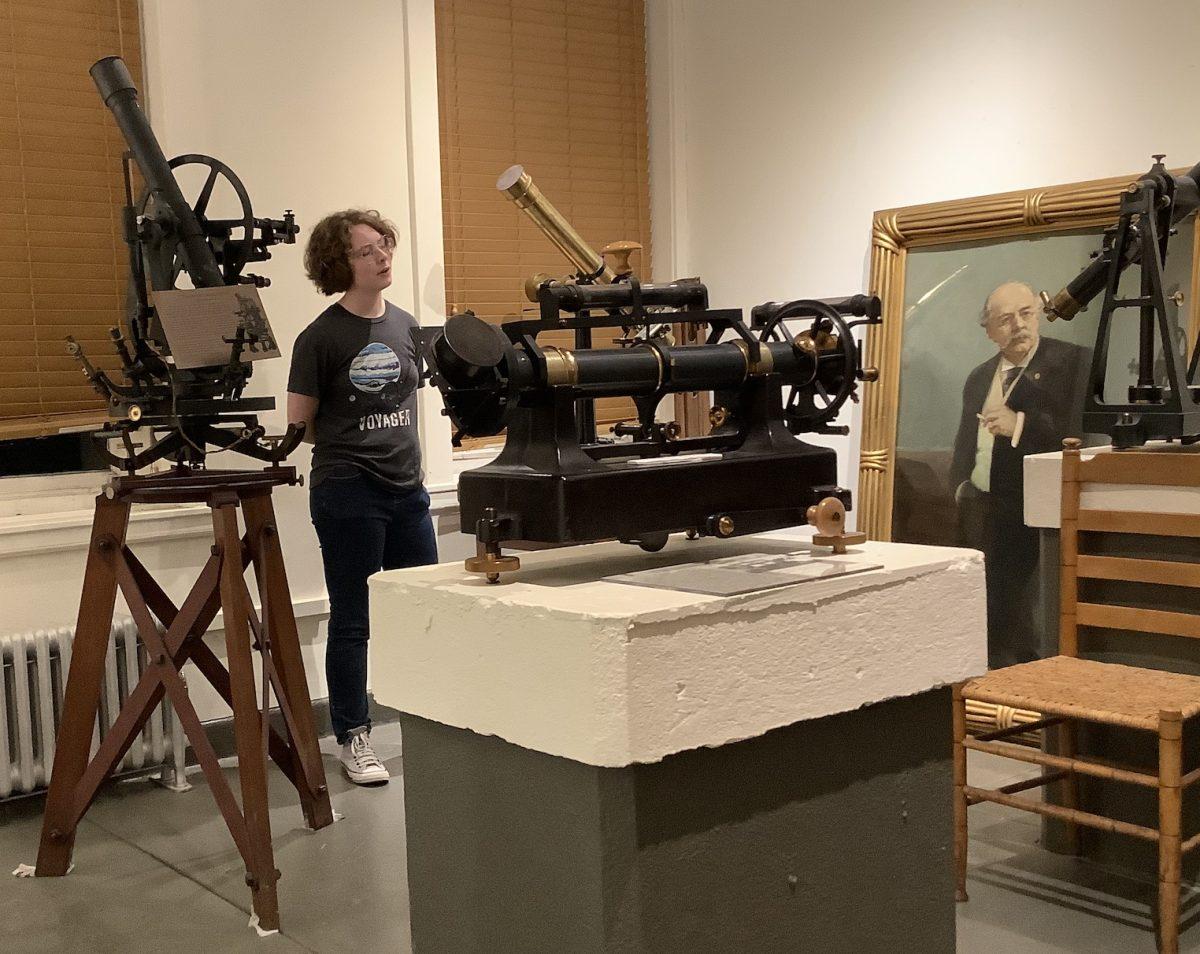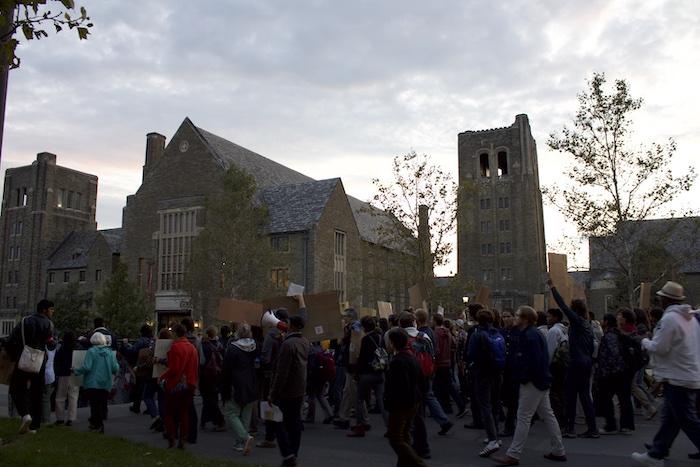It was an unseasonably cold Earth Day on April 22 — a chill came over the Ithaca area, blanketing the small city in temperatures just around the mid-40s and breaking from a week that saw semi-warm temperatures fluctuate little between high-50s and low-60s. But this dip in temperature became a sign of the effects of climate change and an appropriate symbol for the March for Science, an event that brought thousands of people together across the world in support of combating climate change and supporting scientific research and facts grounded in reality.
Hundreds gathered on The Commons to participate in Ithaca’s March for Science, with many holding signs supporting science, climate change, the environment and the medical field.
“Don’t be a sheep, be a scientist.”
“Make Earth great again.”

The event featured a number of speakers from the Ithaca area who discussed the importance of supporting and funding the sciences. Many of the speakers were researchers, professors and scientists themselves.
Jamie F. Dangler, associate professor of sociology at SUNY Cortland, spoke at the event to discuss the important role scientists play in helping people understand their responsibilities as “stewards of this planet.” She said science forms the bedrock of democratic decisionmaking and policy making in all fields.
“Science is so important because it provides us with a grounding in reality, in what the real facts are, in our environment in our ecosystem, etc.,” she said. “And we cannot make policy decisions or any decisions without accurately understanding the world we live in.”
Inspired by and similar to January’s worldwide Women’s March, the greater March for Science movement was organized by a group of scientists as a rebuke to President Donald Trump, who has constantly threatened the funding of and legitimacy of science through policy decisions, statements and anti-science members making up his Cabinet. So far, the president has consistently denied the reality of climate change, proposed budget cuts to several science-oriented federal departments and agencies, attempted to silence government researchers and scientists, hinted at rolling back environmental regulations and staffed his Cabinet with several climate change deniers.
All of this has caused widespread panic among scientists across the U.S., as many now feel that their livelihoods and professions are under threat.
Kirk Tolhurts, who attended Ithaca’s March for Science, is an otolaryngologist who said he was disturbed by the Trump administration’s distrust of science. Tolhurst said he was shown first hand the strengths of science when he had to receive an emergency medical procedure.
“I wouldn’t be here if it weren’t for all the science that led up to our ability to do what we do in medicine,” he said.

Many attendants and speakers at the march also voiced a concern for how Trump’s policies would impact the medical field and subsequent medical research. In Trump’s budget blueprint for 2018, the administration is proposing to cut about $1.2 billion in research grants from the National Institute for Health and other health and education organizations.
Ithaca College senior Olivia McNeely said she felt a duty to attend the march because both her parents are medical professionals and because she studies anthropology. In the medical field, McNeely said science is a life-saving tool of advancement.
“Science is what got us out of what we consider the dark ages,” she said. “People used to think diseases were caused by demons or bad air and now we’re saving people’s lives around the world by coming up with medical answers to what was previously thought to be magical reasons.”

Another issue covered prominently by the March for Science was the topic of climate change. Trump has repeatedly denied the scientifically-backed research showing the impact of climate change on humans and the environment, and once tweeted that climate change was a “hoax” perpetuated by the Chinese. The president has translated this denialism and lack of apathy into policy, as he has signed several executive orders decreasing the scope of environmental regulations established by former-President Barack Obama, voiced support for the construction of potentially dangerous oil pipelines like the Dakota Access Pipeline and the Keystone XL Pipeline and pushed for the revitalization of the coal industry at the expense of the environment.
McNeely said with these decisions, the Trump administration is depriving the people of the ability to take care of the Earth. She pointed to the head of the Environmental Protection Agency, Scott Pruitt, as a prime example of Trump’s lack of care for the environment. Pruitt has previously denied the established science and overwhelming evidence of climate change.
“He used to work for an oil company,” she McNeely said. “He doesn’t have the Earth’s best interest in mind. He doesn’t have Americans’ health in mind — he just has business in mind.”
McNeely said having a business-first mentality is damaging when combined with the field of science.
“Real science is not about making money,” she said. “It’s about making a different and making a change and trying to preserve the Earth and do little damage as possible at this point. And they don’t have that in mind.”

While science has traditionally tried to separate itself from the political sphere, Trump’s blatant denial of scientific research and findings has pushed scientists to wade into the political sphere. Tolhurts said this new politicization of science stems from Trump’s disregard of facts.
“I think he’s politicizing ignorance in favor of science, gut feelings and the next random thought instead of evidence-based reality,” he said.
With thousands of people supporting science in marches across the U.S., Dangler said she hopes the Trump administration sees that people do not support his attacks on scientific research and his plans to cut federal spending on science-centered and environmental federal agencies.
“We need federal support in order to allow scientific work to continue to be done,” she said. “So we hope he and the members of Congress get the message that a budget that slashes research is not acceptable to the people of the United States.”






